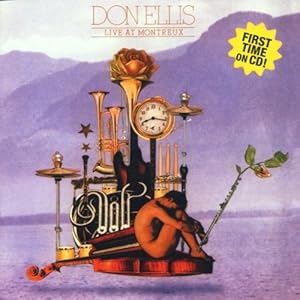Live at Montreux
Date(s) Recorded
July 8, 1977
Tracks
1. Open Wide (Ellis) – 9:40
2. Loneliness (Ellis) – 5:54
3. Future Feature (Ellis) – 7:18
4. Go-No-Go (Ellis) – 5:10
5. Sporting Dance (Ellis) – 8:45
6. Niner Two (Ellis) – 11:59
7. Lyra (Ellis) – 8:32*
8. Eros (Ellis) – 5:39*
9. Arcturus (Ellis) – 10:49*
* Included on CD Reissue, not original LP release
Credits
Don Ellis – Trumpet, Flugelhorn
Ted Nash – Clarinet, Flute, Alto Sax
Laurie Badessa – Violin
Richard Bullock – Bass Trombone
Darrell Clayborn – Bass
Jack Coan – Trumpet
Jim Coile – Clarinet, Flute, Tenor Sax
Dave Crigger – Drums
Mike Englander – Percussion, Drums
Leon Gaer – Synthesizer
Paula Hochhalter – Cello
Alan Kaplan – Trombone
Randy Kerber – Keyboards
Sidney Muldrow – French Horn
Ann Patterson – Flute, Oboe, Piccolo, Alto Sax, Soprano Sax
Gil Rathel – Trumpet
Ruth Ritchie – Percussion, Timpani
Jimbo Ross – Viola
Jim Self – Tuba
Jim Snodgrass – Flute, Oboe, Piccolo, Baritone Sax
Glenn Stuart – Trumpet
Pam Tompkins – Violin
Carlos “Patato” Valdes – Bongos, Conga
Liner Notes
Don Ellis (short quote)
Nick DiScala (CD Release only)
Releases
Atlantic SD 19178 (1978)
Koch Jazz 51410 (2002) – CD Reissue
Notes
Studio-recorded versions of “Arcturus,” “Eros,” and “Lyra” appear
on Music from Other Galaxies and Planets.
Live at Montreux (1978) was Ellis’s final recording.
Prior to its release, Atlantic had agreed to commit the funds necessary to send the Ellis Orchestra to the 1978 Montreux Jazz Festival for a new live recording and an ensuing tour.
In anticipation for the festival, Ellis began feverishly preparing and rehearsing new compositions that would ultimately appear on the live recording at Montreux.
However, in the middle of Ellis’s preparation, Atlantic demanded that Ellis record a version of the popular main theme to Star Wars by John Williams in order to capitalize on the commercial success of the film.
Ellis complied and recorded an arrangement of the theme as a single, with “Princess Leia’s Theme” on side B.
Atlantic then expressed concern that the single could potentially receive significant radio airplay, and there would be no associated album to sell in order to capitalize on its popularity.
Thus, prior to Montreux, Ellis was compelled to compose new selections – not duplicating any of those slated for the live recording at the festival.
Ellis completed the compositions and recording of the new album in a matter of days.
The result was Ellis’s most-commercial and least-inspired recording of his career.
This recording offers reflections of the more adventurous Ellis ensemble recordings on selections such as “Future Feature,” “Sporting Dance,” and “Niner Two.” However the disco-influenced “Go-No-Go” indicates Ellis’s continued connection to popular styles.
The selection “Open Wide” enjoyed some degree of popularity with its 4/4 meter and accessible main theme.
Despite the conventional meter, the selection also represents an excellent example of Ellis’s rhythmic superimpositions over the barline.
Live at Montreux demonstrates a more-restrained use of exotic meters, but a more-liberated use of rhythmic superimpositions.


